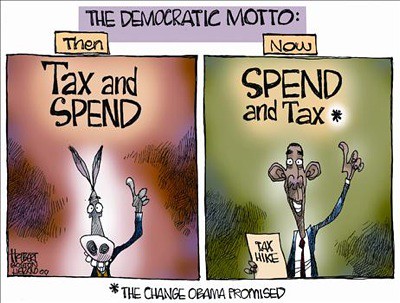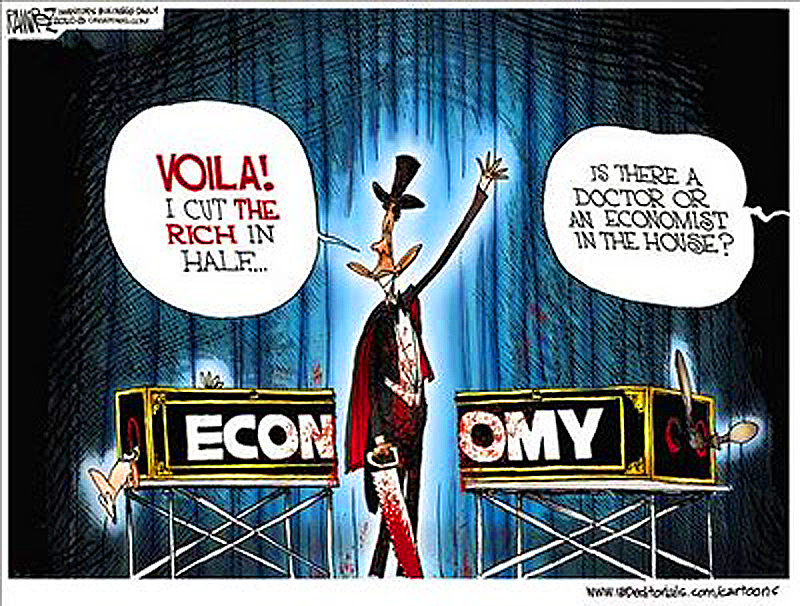REAL CLEAR POLITICS
An Overdue Book - The Facts about Spending & Taxes
by Thomas Sowell
November 27, 2012
If everyone in America had read Stephen Moore's new book, "Who's The Fairest of Them All?", Barack Obama would have lost the election in a landslide.
The point here is not to say, "Where was Stephen Moore when we needed him?" A more apt question might be, "Where was the whole economics profession when we needed them?" Where were the media? For that matter, where were the Republicans?
Since "Who's The Fairest of Them All?" was published in October, there was little chance that it would affect this year's election. But this little gem of a book exposes, in plain language and with easily understood facts, the whole house of cards of assumptions, fallacies and falsehoods which constitute the liberal vision of the economy.
Yet that vision triumphed on election day, thanks to misinformation that was artfully presented and seldom challenged. The title "Who's The Fairest of Them All?" is an obvious response to liberals' claim that their policies are aimed at creating "fairness" by, among other things, making sure that "the rich" pay their "fair share" of taxes. If you want a brief but thorough education on that, just read chapter 4, which by itself is well worth the price of the book.
A couple of graphs on pages 104 and 108 are enough to annihilate the argument about "tax cuts for the rich." These graphs show that, under both Republican President Calvin Coolidge and Democratic President John F. Kennedy, high-income people paid more tax revenues into the federal treasury after tax rates went down than they did before.
There is nothing mysterious about this. At high tax rates, vast sums of money disappear into tax shelters at home or is shipped overseas. At lower tax rates, that money comes out of hiding and goes into the American economy, creating jobs, rising output and rising incomes. Under these conditions, higher tax revenues can be collected by the government, even though tax rates are lower. Indeed, high income people not only end up paying more taxes, but a higher share of all taxes, under these conditions.
This is not just a theory. It is what hard evidence shows happened under both Democratic and Republican administrations, from the days of Calvin Coolidge to John F. Kennedy to Ronald Reagan and George W. Bush. That hard evidence is presented in clear and unmistakable terms in "Who's The Fairest of Us All?"
Another surprising fact brought out in this book is that the Democrats and Republicans both took positions during the Kennedy administration that were the direct opposite of the positions they take today. As Stephen Moore points out, "the Republicans almost universally opposed and the Democrats almost universally favored" the cuts in tax rates that President Kennedy proposed.
Such Republican Senate stalwarts as Barry Goldwater and Bob Dole voted against reducing the top tax rate from 91% to 70%. Democratic Congressman Wilbur Mills led the charge for lower tax rates.
Unlike the Republicans today, John F. Kennedy had an answer when critics tried to portray his tax cut proposal as just a "tax cut for the rich." President Kennedy argued that it was a tax cut for the economy, that changed incentives meant a faster growing economy and that "A rising tide lifts all boats."
If Republicans today cannot seem to come up with their own answer when critics cry out "tax cuts for the rich," maybe they can just go back and read John F. Kennedy's answer.
A truly optimistic person might even hope that media pundits would go back and check out the facts before arguing as if the only way to reduce the deficit is to raise tax rates on "the rich."
If they are afraid that they would be stigmatized as conservatives if they favored cuts in tax rates, they might take heart from the fact that not only John F. Kennedy, but even John Maynard Keynes as well, argued that cutting tax rates could increase tax revenues and thereby help reduce the deficit.
Because so few people bother to check the facts, Barack Obama can get away with statements about how "tax cuts for the rich" have "cost" the government money that now needs to be recouped. Such statements not only promote class warfare, to Obama's benefit on election day, they also distract attention from his own runaway spending behind unprecedented trillion dollar deficits.
Read more: http://goo.gl/hufEO

AMERICAN THINKER
Obama's Next Move: The Global Warming Tax
by Brian Sussman
November 28, 2012
This week the United Nations begins two weeks of climate talks in Doha, Qatar. The primary goal of these meetings is to draw President Obama into accepting a redistribution plan designed extract money from the U.S. economy in the form of a global warming tax and doling out the cash to Third World nations.
"There will be expectations from countries to hear a new voice from the United States," said Jennifer Morgan, director of the climate and energy program at the World Resources Institute in Washington.
The meeting in Qatar's capital will focus on ramping up what is described as "climate financing for poor nations." American leadership is considered crucial to these plans.
"We need the U.S. to engage even more," said European Union Climate Commissioner Connie Hedegaard. "Because that can change the dynamic of the talks."
And carrying the water in support of this global scheme are the media, selecting their talking points from a recent World Bank report claiming global temperatures are likely to increase by more than 6 degrees, leading to "extreme heat waves, declining global food stocks, loss of ecosystems and biodiversity, and life-threatening sea level rise."
Given that since 1850 the earth's temperature has only warmed 1.2 degrees (with 88 percent of that warming occurring before 1940), and that the global average temperature has not risen since 1998, a six-degree hike flies in the face scientific sanity.
The lame duck Obama administration will likely be all over this UN plan. As a U.S. senator in 2008, Obama sponsored a bill known as the "Global Poverty Act." The bill would have made levels of U.S. foreign aid spending subservient to the dictates of the United Nations.
Joe Biden, then chairman of the Senate Foreign Relations Committee, was a vocal supporter of the legislation which would commit the U.S. to spending 0.7 percent of gross national product on foreign aid, which amounts to a phenomenal 13-year total of $845 billion over and above what the U.S. already spends.
A release from the Obama Senate office about the bill declared, "In 2000, the U.S. joined more than 180 countries at the United Nations Millennium Summit and vowed to reduce global poverty by 2015... it is time the United States makes it a priority of our foreign policy to meet this goal and help those who are struggling day to day."
Obama's bill would have required the president "to develop and implement a comprehensive strategy to further the United States foreign policy objective of promoting the reduction of global poverty, [and] the elimination of extreme global poverty..."
The primary vehicle for such a redistribution plan would be a tax or fee on businesses that produce carbon dioxide as a byproduct of their activities. This could include power plants, refineries, cement manufacturers, and dairy farmers. Those increased costs of production would be passed along to the consumer in the form of higher prices.
A tax on carbon dioxide would also be seen by politicians as a way to offset our severe budget deficit and staggering national debt. It would be sold to the American public in the name of saving the planet.
Obama may be another step closer to realizing his 2008 dream of massive global wealth redistribution.
Read more: http://goo.gl/9WDxU

Fiscal cliff a tale of two tax headaches: Small business vs big business
by Tim Cavanaugh
November 28, 2012
Fiscal cliff negotiations and the fight over individual tax increases have exposed a deep division in business tax policy. The controversy pits large and small U.S. companies against each other while reversing many expected distinctions between the political left and right. According to one tax activist, the struggle “will be larger than the tea party.”
At issue is President Barack Obama’s proposal to let temporary 2002-era individual income tax rates, popularly known as the “Bush tax cuts,” expire for households earning more than $250,000 a year. Although lower tax rates for high earners have been renewed several times, the president is determined to raise taxes in the lame-duck budget negotiations.
But while the president and Democrats depict the tax hike as being limited to high net-worth individuals, the higher individual rate could impact millions of small businesses.
According to a 2011 Ernst & Young study conducted for the S Corporation Association (SCA), about 26 million businesses in the United States are organized as “flow-through” entities—Subchapter S corporations, partnerships and sole proprietorships in which profits pass through to owners. These entities employ about 70 million people and, according to the SCA, account for the majority of business activity in the United States.
That’s a very different class of businesses from the large Subchapter C corporations who were represented in a recent White House meeting regarding the fiscal cliff. There, Obama met with the leaders of General Electric, Honeywell, IBM, Xerox, American Express, Wal-Mart, Procter & Gamble, Ford, PepsiCo and Chevron.
These companies are seeking a particular favor from the White House—a cut in the corporate tax rate, which, at 35 percent, is the highest among developed nations that are members of the Organization for Economic Co-operation and Development. Obama has indicated he favors a drop in the corporate rate. The Business Roundtable, a group representing large companies, advocates a 25 percent corporate rate but has for the most part not engaged the issue of the Bush tax cuts. Many advocates say this signals indifference to the way a tax hike will hit small businesses.
“I have sat in a room with the small guys and the big guys and the senators working on this,” Grover Norquist, president of Americans for Tax Reform, said in an interview. “It’s very clear the Subchapter S guys were worried. But the president doesn’t see them as businesses.”
Because Roosevelt Room meetings with the president are widely viewed as providing public relations cover for administration policy, and because the president’s invitation list included only large, powerfully connected corporations, advocates for small business worry that this could signal a rift in business unity on taxes.
“Small businesses … are especially worried because they are facing the prospect of higher personal tax, which is how many of them pay their taxes, and in addition they soon will be dealing with all the costs and mandates of Obamacare and other regulations,” the U.S. Chamber of Commerce said in a statement. The Chamber, which has had a volatile history with Obama, urged politicians to “extend all of the current tax rates and other expiring tax incentives and then in 2013 negotiate a Big Deal to control the debt and put our economy on a path to robust growth.”
Read more: http://goo.gl/7RlJd


No comments:
Post a Comment